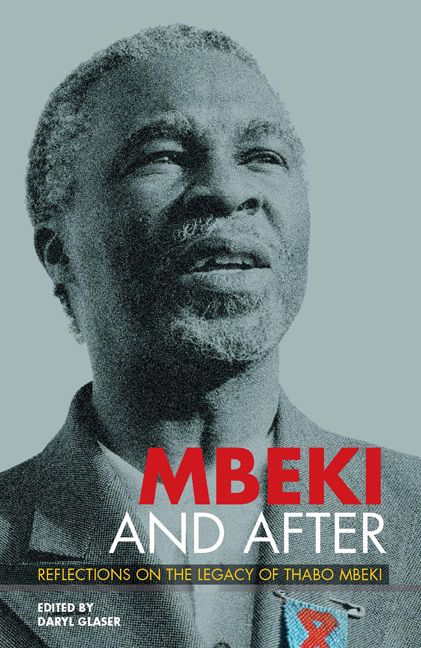Book contents
- Frontmatter
- Contents
- Acknowledgements
- Acronyms
- General Reflections
- The Mbeki Style Of Governance
- Mbeki And Society
- Mbeki And Race
- 7 Seeing ourselves as others see us: Racism, technique and the Mbeki administration
- 8 Towards a common national identity: Did Thabo Mbeki help or hinder?
- Mbeki Abroad
- Notes
- Contributors
- Bibliography
- Index
8 - Towards a common national identity: Did Thabo Mbeki help or hinder?
from Mbeki And Race
Published online by Cambridge University Press: 21 April 2018
- Frontmatter
- Contents
- Acknowledgements
- Acronyms
- General Reflections
- The Mbeki Style Of Governance
- Mbeki And Society
- Mbeki And Race
- 7 Seeing ourselves as others see us: Racism, technique and the Mbeki administration
- 8 Towards a common national identity: Did Thabo Mbeki help or hinder?
- Mbeki Abroad
- Notes
- Contributors
- Bibliography
- Index
Summary
THE CHALLENGE
The notion of a common national South African identity is a conceptual migraine. If one defines too broadly what it means to be South African one is likely to capture traits that are not specific to South Africa, such as being sports-loving or friendly. These traits hardly ever find universal expression within any country and therefore tend to reflect a wish list rather than an accurate descriptive claim about being South African or English or Australian or whatever. On the other hand, trying to avoid these difficulties by narrowing the definition creates the opposite problem: invariably it excludes individuals who could not reasonably be excluded from the tag ‘South African’, if such a tag were to be accepted. If you define a South African as someone who loves meat, for example, then the very idea of a vegetarian South African becomes oxymoronic.
Mindful of these and other difficulties – is national identity an objective or subjective state; is it a good thing? – I will first defend a particular notion of common national identity (CNI) before probing Mbeki's role in constructing it in South Africa. In doing this I will draw on the recent work of African-American philosopher Tommie Shelby. I specifically draw on a key argument in Tommie Shelby's We Who Are Dark. Although Shelby is concerned with a different project, that of making sense of black identity and, in particular, of whether non-essentialist notions of black identity can be the basis for black solidarity, one aspect of the architecture of his analysis will serve as the foundation for an analogous treatment of the concept of a CNI.
As I will explain, Shelby distinguishes between ‘thick’ and ‘thin’ conceptions of blackness. It is thick conceptions of blackness that carry all the essentialist baggage and which he discards for good reason, and considers unnecessary (even harmful) to black solidarity. He argues that a politics of solidarity in fighting racial oppression can be built upon the thin identity of blacks in terms of phenotype or lineage, simply because it was blacks socially construed in these thin terms who were singled out for anti-black racism.
- Type
- Chapter
- Information
- Mbeki and AfterReflections On The Legacy Of Thabo Mbeki, pp. 187 - 206Publisher: Wits University PressPrint publication year: 2009

